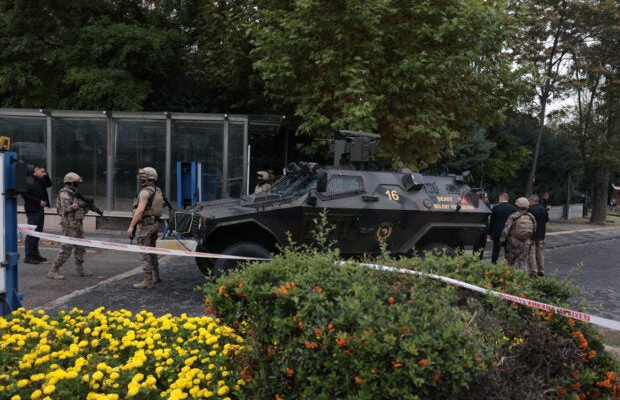Terror strikes again in Turkey

Is Erdoğan being punished for defying the US?
The last thing President Recep Tayyip Erdoğan expected, amid the crises and conspiracies surrounding him from every side since he won Turkey’s presidential and parliamentary elections, was Sunday’s terrorist bombing outside the interior ministry in Ankara. It took place just metres from parliament whose inaugural session
Erdoğan attended in person and was due to discuss lifting Turkey’ veto on Sweden’s admission to NATO.
The attack — in which one perpetrator blew himself up and the other was shot dead by security forces — comes at a difficult time for Erdoğan and his governing AK party. The economic crisis is worsening with the currency weakening and inflation rising, and even the lucrative tourism industry taking a hit after a spate of racist attacks on Arab tourists.
The bombing was the first in Ankara for six years, and comes nearly a year after the Taksim Square attack in Istanbul in which six people were killed and 81 injured.
The fingers of blame were immediately pointed at the separatist Kurdistan Workers Party (PKK). But it plausible that other parties backed by the US were involved. Turkey’s relations with the US are going through a period of crisis due to Erdoğan’s friendship with Russia’s Vladimir Putin, the burgeoning military and economic cooperation between the two countries, and Turkey’s neutrality in the Ukraine war.
It was telling that US President Joe Biden avoided meeting with Erdoğan at both the UN General Assembly and the recent G-20 summit in India. The unattributed bombing could have been a warning from Washington to the Turkish leader in protest at his embrace of Russia, neutrality in Ukraine, and resistance to Sweden joining NATO.
Biden’s pet project unveiled at the G-20 summit for a rail link between India and Europe completely excluded Turkey (and other major countries like Iraq, Iran, and Egypt) in favour of Gulf states, Jordan, and Israel. This raised many questions about why Washington was snubbing its NATO ally.
In his speech to parliament after the bombing, Erdoğan described it as terrorism’s “last gasp”. It is to be hoped his optimism is well-placed. But given the high tension with Washington, other eventualities cannot be ruled out. The attack could herald the start of a renewed US-approved terror campaign targeting Tukey, Erdoğan, and his party.
Erdoğan’s best option for countering any such campaign would be to act fast to mend relations with Syria, strengthen ties with Iran, and further boost cooperation with Russia and China. When I met President Bashar al-Asad at his home in Damascus in May, he did not say a single bad word about Erdoğan and expressed his readiness to meet with him, work together against terrorism, and restore relations with Turkey to how they were before the US launched its campaign to break Syria up and change its regime. Asad’s only condition was for Erdoğan to withdraw Turkish forces form northern Syria. That is a logical and reasonable requirement by any standard.
So it was disappointing to hear Turkey’s new defence minister, Yasar Guler, say that while Ankara was willing to resume talks with the defence ministers of Syria, Russia, and Iran, “the demands of the Syrian side cannot be accepted immediately.” He explained: “They want Turkey to leave Syrian territory. Why should Turkey leave? The Syrian side may not find the time to deal with some areas where we have established peace and stability, and to control and expel those who are stealing and selling the Syrian people’s oil” — a reference to the US-backed Kurdish Syrian Democratic Forces (SDF).
Turkey could be facing a fresh wave of bombings aimed at undermining its security and stability and hitting its vital tourism sector. It needs to reconsider and change many of its previous policies and priorities in line with changing domestic and international conditions, starting by normalising relations with its neighbours, especially Syria. The solution lies in reviving the 1998 Adana agreement, as proposed by Putin, and resuming security cooperation with Syria to provide joint protection to their shared border.
https://www.raialyoum.com/terror-strikes-again-in-turkey/
 TheAltWorld
TheAltWorld 
0 thoughts on “Terror strikes again in Turkey”